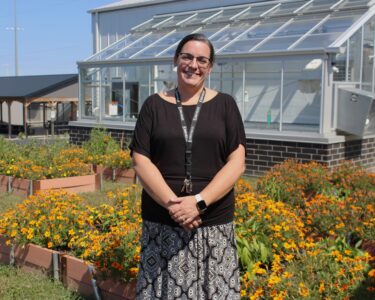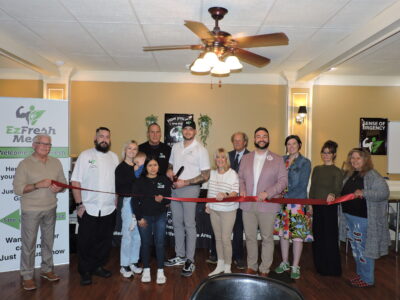JCBDD learns how important its services are
STEUBENVILLE — Jefferson County Board of Developmental Disabilities administrators and staff learned how vital their services are throughout the lifetime of their clients during a presentation on April 30.
Kari Jones, president and CEO of Elevate DD, addressed more than 20 people in the Jeffco Center and shared how important services are to families that require assistance. Jones said the Columbus-based Down Syndrome Association of Central Ohio assisted families for the past 40 years and was rebranded as Elevate DD, creating a platform for advocacy, education and innovation for the developmental disability community in Ohio.
It also oversees Learning Aid Ohio and Adult Literacy Ohio, which benefit the Down syndrome and developmental disability communities. Learning Aid Ohio provides tutors and works one-on-one with about 4,500 children across the state, while Adult Literacy Ohio helps people learn to read so they can live more independent lives. Jones said officials are collecting data and looking for funding to make more of an impact with the literacy program and is currently working on a survey with the Ohio Center for Autism and Low Incidence.
Jones said organizations such as JCBDD are there for families through the stages of life–early intervention, school age and adulthood. She also spoke on a professional and personal level, through her role with Elevate DD as well as the sister and mother of loved ones with special needs. She said her younger brother, Alex, was born with Down syndrome while her 8-year-old daughter, Evelyn, was born with a heart defect and was recently diagnosed with autism.
“I’ve never known a world without Down syndrome in it and my daughter was born with multiple congenital heart defects and had open-heart surgery at 13 days old. She came home after five weeks in the hospital and received an autism diagnosis at 8 years old,” she said. “I love working in this field and working with families.”
Jones said despite her work, she felt confused as a parent when she learned of her child’s condition. For her, it also put things into perspective and allowed her to view situations through the eyes of the people she serves. She noted that when families get an unexpected diagnosis, they are confused or overwhelmed; may have financial barriers to navigate, face endless paperwork and seek future childcare options, plus there is an impact on siblings.
“Even though I spent my career in the field, I shut down. I felt lucky I was in a position where I knew there were resources, but there are families that don’t understand that,” she continued. “I know you already know how delicate of a time it is for families, but you are important. How families feel with you in the beginning is powerful. You could be that person that makes an impact and tells them it’s OK.”
Jones added that when families need aid during any stage of life, every phase is new and can be difficult to navigate. She noted that reviewing resources in the community and online can prove challenging and suggested documenting information through e-mails for parents’ reference. She also suggested keeping flow charts to help share the next steps and people the family may be working with. Jones also praised the JCBDD for its website for sharing resources and making them accessible to the public.
JCBDD Superintendent Michael Zinno said the site was also commended during a recent review but asked for ideas to further improve it. Jones suggested asking parents from each age group for input, and Zinno replied JCBDD board member Mindy Aleksiejczyk had a Special Needs Parents Support Group of the Ohio Valley Facebook page that could be helpful.
During more discussion, Jones said parents may wonder if BDD’s are involved with school-age youth once early intervention ends and if they could receive further support. To that, the answer was yes.
“You provide information and support as families navigate through life,” she commented. “It is a fact that we are still living in a direct support professional crisis across Ohio and we also have a childcare crisis. It is extremely difficult for families with children with special needs to find childcare. Our survey received nearly 800 responses from across the state and 70 percent said not having access has significantly impacted their ability to work. What are families supposed to do to meet their children’s needs?”
Jones said officials need to figure out a solution and improve things for the people they help.
“You are the only consistency to help families navigate through the years.”
As teens, families would learn about Opportunities for Ohioans with Disabilities, which empowers Ohioans with disabilities through employment, disability determination and independence; look at whether college is an option for their child; discover supports through their Service and Support Administration; and learn when they are able to receive financial waivers. They are also deciding what to do next once the teen reaches adulthood, such as work or day programs.
“The reality is when a child is out of school, they are back to square one. You as professionals have to listen to the families and the client,” Jones continued. “Your organization seems to have those pieces in place.”
As they reach adulthood, families may look at independent living opportunities. In her brother’s case, Alex has been residing on his own and holding a job. Jones said families look at providers and what she called the “unmentionables,” such as what will happen to them once the parents are gone. She said they must consider how choices for the adult child affects the families and if they are tired and need help.
“Everything is new at every phase of life. Our families carry a mental load that is so heavy,” she said. “In an emotional safe space, encourage conversations on what to do. You are a beautiful space in your roles to help them out, which is a really valuable place to be.”
Jones suggested the representatives help families build a network of support and rally around resources to give them mental space. She also noted that they continue to support, recognize that families are managing extra issues and that sometimes more options are overwhelming. She also urged them to lean on trusted community partners whenever possible.
“We are a concierge; we are there to help guide and support,” she concluded.





